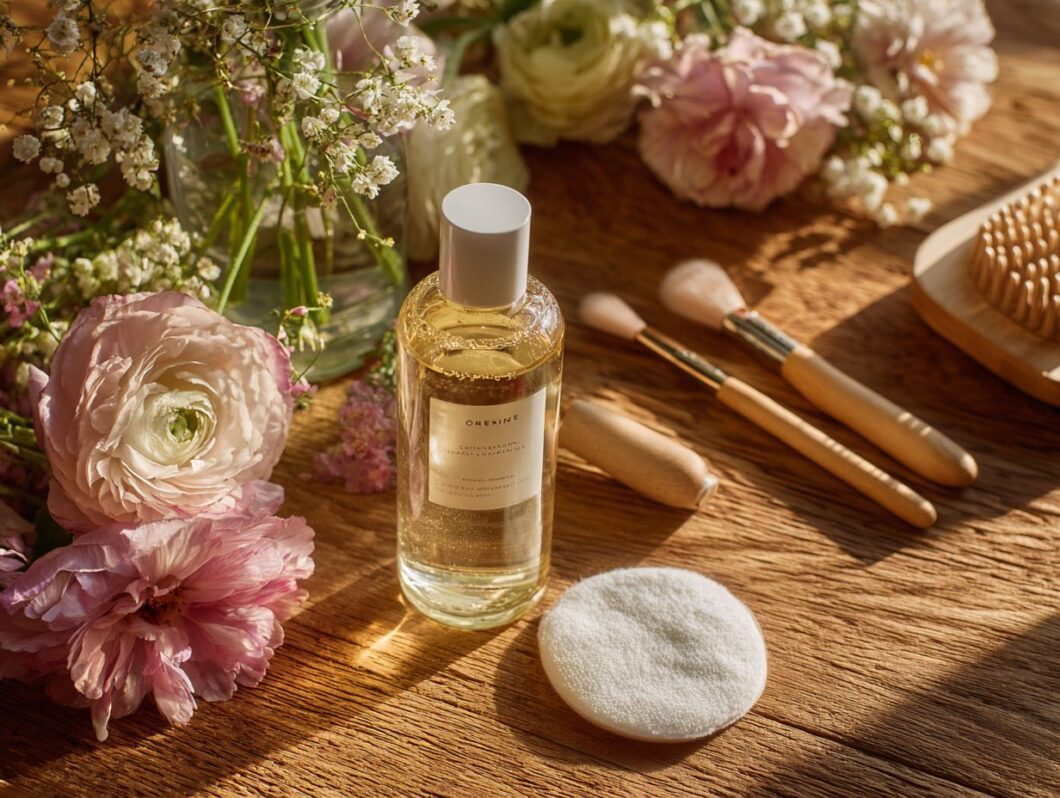Are facial toners truly necessary in your essential skincare routine? This question has sparked debate among experts like Dr. Ted Lain and brands such as Paula’s Choice and Tonic toner. While toners can play a vital role in restoring skin and maintaining pH balance, their necessity varies based on individual skin types, toning benefits, and concerns. In this article, we’ll explore the truth about toners, helping you determine if this step is right for you and how it can enhance your overall skincare regimen.
Key Takeaways:
What is a Toner?
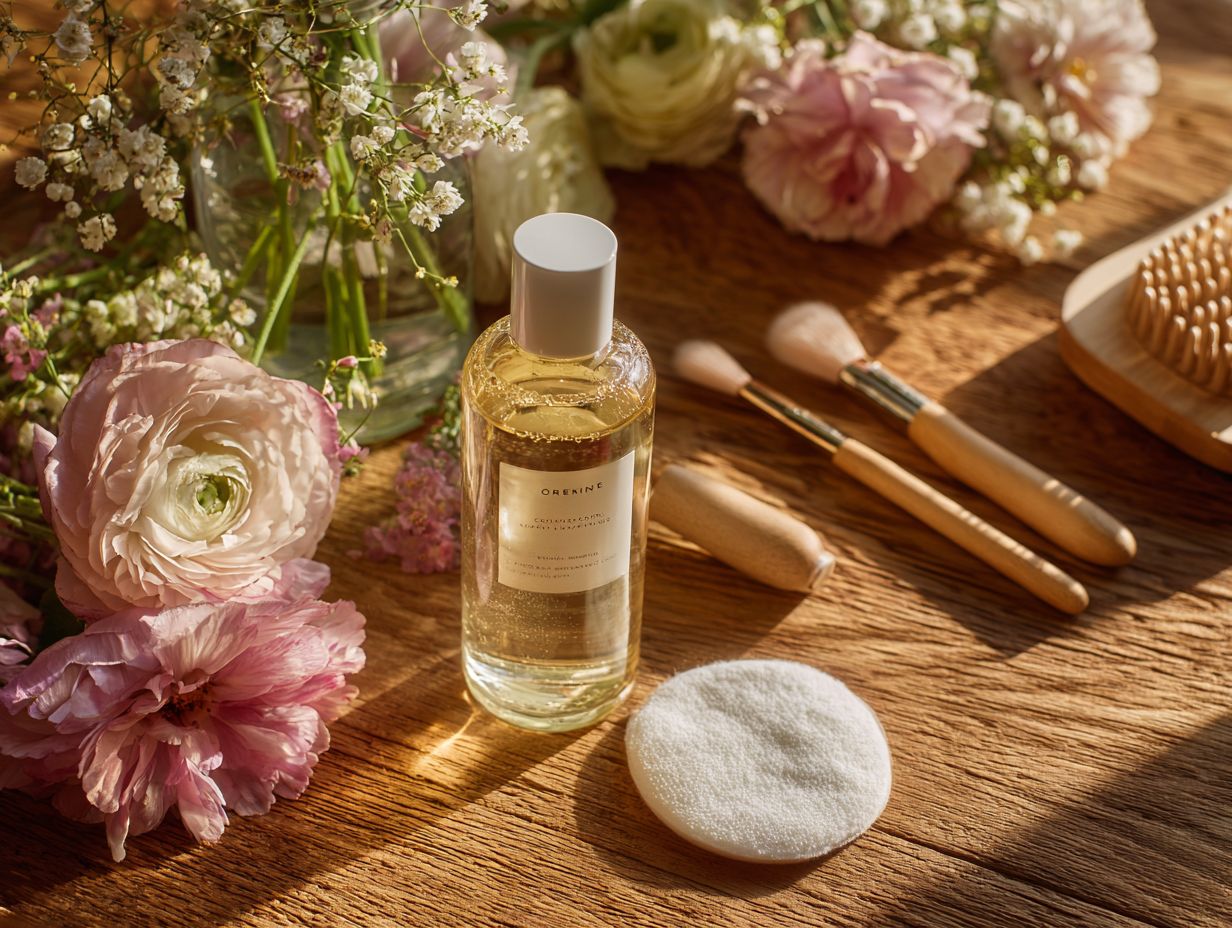
A facial toner is a liquid skincare product that I utilize to prepare my skin for further treatment by restoring its pH balance and providing a hydration boost. I have found that using toner regularly can significantly improve my skin’s texture and overall appearance.
Hydrating toners, often infused with hydrating ingredients like hyaluronic acid or aloe vera, provide necessary moisture while soothing any irritation I may experience.
Exfoliating toners, which contain alpha or beta hydroxy acids, effectively remove dead skin cells and lead to refined pores and a smoother surface. I recommend options such as:
- Thayers Witch Hazel for hydration
- Paula’s Choice Skin Perfecting 2% BHA Liquid for gentle exfoliation
I apply toner after cleansing, using either a cotton pad or my hands, as effective toner application allows for better absorption of the subsequent skincare products.
History and Evolution of Toners
Initially, toners were primarily alcohol-based astringents, but I have observed their evolution into a diverse range of formulations suitable for all skin types, including alcohol-free toner options. Today, toners serve multiple functions, such as balancing pH levels, hydrating the skin, and providing targeted treatments.
For individuals with sensitive skin, I find that options like rose water, a gentle and effective toner, are particularly gentle. On the other hand, exfoliating formulas featuring ingredients like glycolic acid are effective for those with oily or acne-prone skin.
Brands such as Thayers have gained popularity for their soothing witch hazel toners, which are renowned for their non-drying properties. Meanwhile, those focusing on anti-aging benefits may prefer toners infused with antioxidants like vitamin C, particularly products from Paula’s Choice.
This evolution in toners underscores a significant shift within the beauty industry towards inclusivity and advancements in skincare technology.
The Purpose of Using Toners
I understand that toners play multiple essential roles in a skincare routine, including balancing the skin’s pH and removing any residual impurities that may remain after cleansing.
Balancing Skin pH
One of the primary roles of toners in my skincare routine is to restore the skin’s natural pH balance, which is crucial for maintaining overall health and function. Dermatologists like Dr. Ted Lain emphasize that a balanced pH is essential in preventing excess oil production and acne.
Additionally, Dr. Nikoleta Brankov points out that toners with ingredients such as witch hazel or rose water can effectively neutralize skin acid levels.
For instance, I find that Thayers Witch Hazel Toner, which contains soothing ingredients like aloe vera, works exceptionally well for sensitive skin. On the other hand, Paula’s Choice Skin Balancing Pore-Reducing Toner is specifically formulated for oily skin and helps minimize the appearance of pores.
Incorporating these toners into my regular skincare routine can significantly enhance my regimen, promoting a glowing complexion and healthier skin.
Removing Residual Impurities
I find that toners are highly effective in removing any residual makeup, dirt, and impurities that cleansing might miss, leading to cleaner, healthier skin and enhancing skin health. For example, the Fresh Rose Deep Hydration Facial Toner not only provides hydration but also balances the skin’s pH and tightens pores, making it an excellent choice for a refreshing post-cleanse routine.
Incorporating a toner into my regimen significantly enhances the efficacy of my skincare products, as it prepares my skin for better absorption of serums and moisturizers. By applying toner with a cotton pad or simply patting it on with my hands, I notice increased smoothness and a visible glow, which contributes to a clearer complexion over time.
Types of Toners
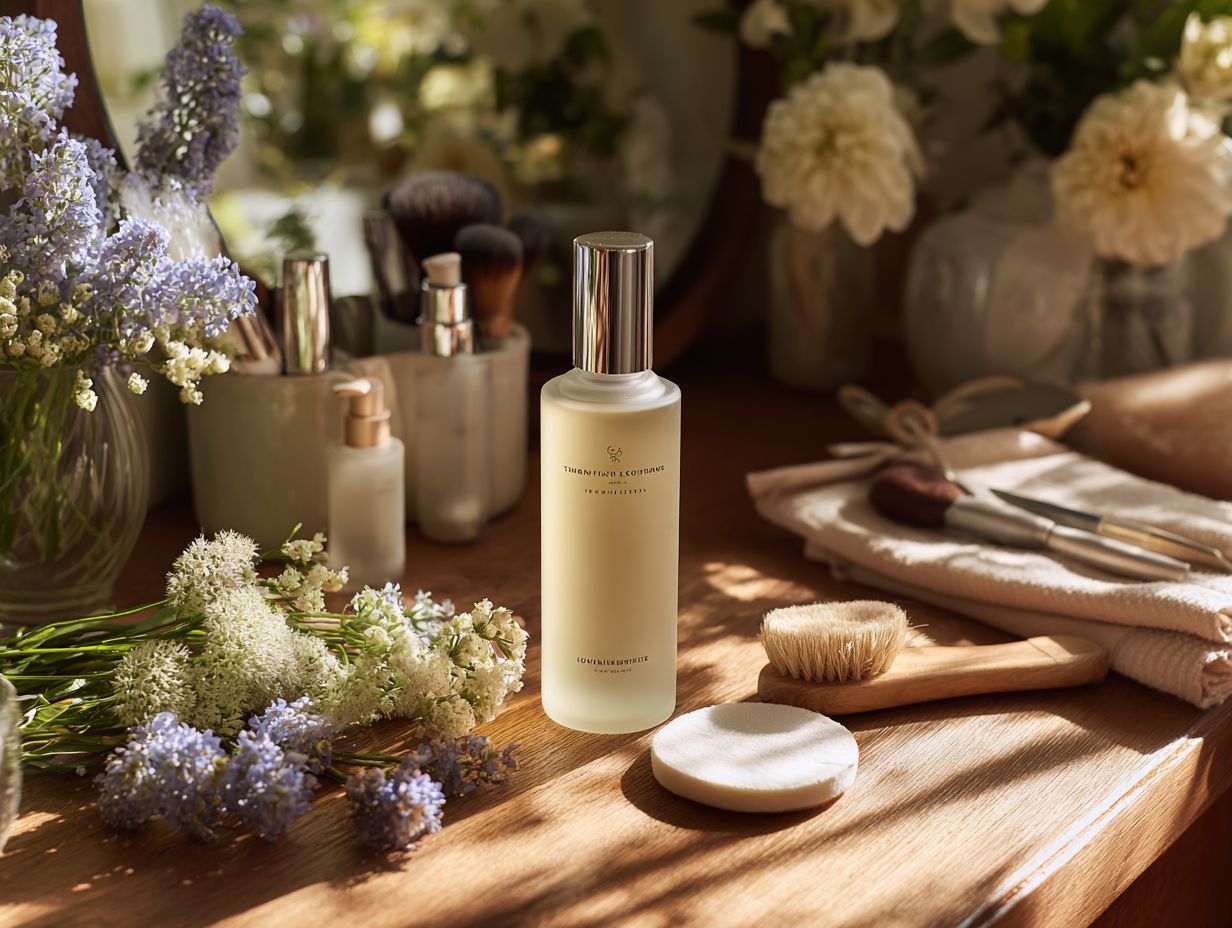
I categorize toners into several types, each designed to address specific skin needs and conditions.
Hydrating Toners
I find that hydrating toners are expertly formulated with key ingredients such as glycerin and hyaluronic acid, providing an immediate moisture boost to the skin.
For example, I appreciate the Klairs Supple Preparation Toner, which includes plant extracts and hyaluronic acid, making it particularly beneficial for dry skin.
Another excellent option I recommend is Thayers Witch Hazel Toner, which combines soothing witch hazel with aloe vera for a calming effect.
Additionally, I consider the Paula’s Choice Enriched Toner, which is rich in antioxidants and can help restore the skin’s barrier function.
When selecting the right toner, it’s essential to consider one’s skin type, specific concerns, and the importance of toner benefits. Incorporating one of these toners into a skincare routine can significantly enhance hydration and promote overall skin health.
Exfoliating Toners
Exfoliating toners are valuable skincare products that contain active ingredients such as salicylic acid or glycolic acid, both of which promote cell turnover, refine skin texture, and contribute to glowing skin.
One excellent option I recommend is Kate Somerville Liquid Exfolikate. This toner combines glycolic and salicylic acids, effectively targeting acne and minimizing the appearance of pores, making it particularly suitable for those with uneven skin texture.
Another option to consider is Paula’s Choice Skin Perfecting 2% BHA Liquid Exfoliant. Its salicylic acid penetrates deeply to combat breakouts and blackheads, delivering impressive results.
For individuals with sensitive skin, Pixi Glow Tonic, which contains 5% glycolic acid, is a gentle choice that exfoliates without causing irritation. Incorporating any of these toners into a skincare routine 2-3 times a week can significantly enhance the skin’s clarity and smoothness.
Astringent Toners
Astringent toners, often infused with witch hazel, effectively manage excess oil production and minimize the appearance of pores. These toners not only help control shine but also prepare the skin for subsequent treatments.
For example, I find the 100% PURE Tea Tree & Willow Clarifying Astringent particularly effective due to its natural, oil-fighting ingredients like tea tree oil and willow bark. Another excellent choice is Thayers Alcohol-Free Witch Hazel Toner, which is both gentle and highly effective.
Incorporating a toner into my daily routine has significantly enhanced my skincare regimen by keeping my pores clear, managing excess oil, and controlling breakouts. I recommend using it after cleansing and before moisturizing for optimal results.
Do You Really Need a Toner?
Deciding whether to incorporate a toner into my skincare routine often depends on my individual skin type and specific skin concerns.
Skin Type Considerations
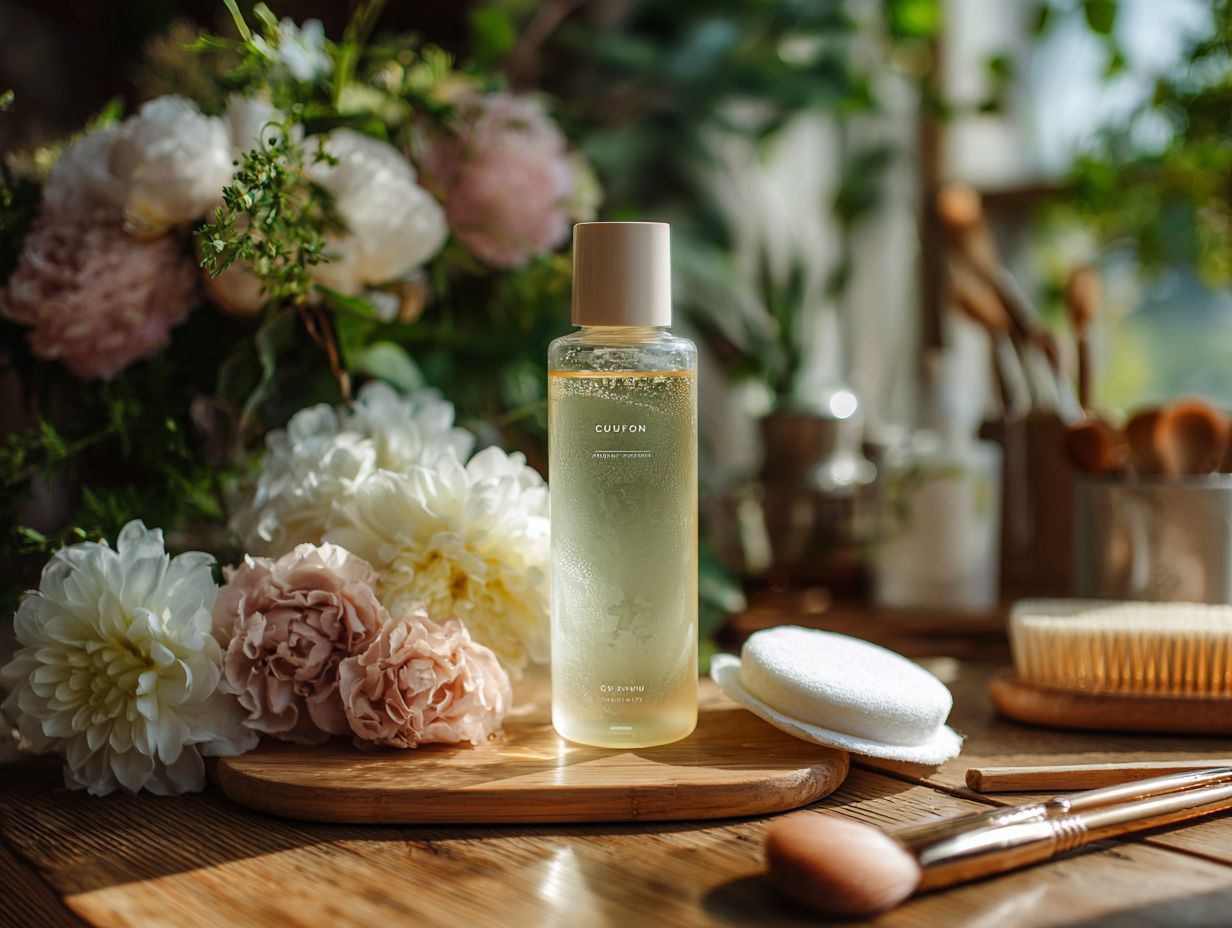
Understanding my skin type is essential in determining whether a toner is suitable for me, as different formulations address various skin concerns.
For sensitive skin, dermatologists recommend alcohol-free toners with calming ingredients such as chamomile or aloe vera to effectively cleanse refresh. For example, I find that the Thayers Witch Hazel Toner hydrates my skin without causing irritation.
For oily skin types, astringent formulas, such as Paula’s Choice Skin Perfecting 2% BHA Liquid, are beneficial as they help clear pores and reduce shine. On the other hand, individuals with dry skin should consider hydrating toners like the Klairs Supple Preparation Facial Toner, which contains hyaluronic acid to provide moisture.
It’s important for me to accurately identify my skin type and choose products accordingly to achieve the best results.
Alternatives to Toners
If I find toners to be unnecessary, I recognize that alternatives like micellar water and hydrating mists can offer similar benefits for refreshing the skin and providing essential skincare.
Micellar water serves as an excellent option for quick cleansing, making it particularly useful on busy days or after a workout. It effectively removes makeup and impurities without the need for rinsing, which adds to its convenience.
On the other hand, hydrating mists, often infused with beneficial ingredients like rose water or aloe vera, can instantly revitalize the skin throughout the day. These sprays can also help set makeup, providing a dewy finish that many find appealing.
Both alternatives are typically alcohol-free, which makes them gentle enough for sensitive skin, and they can be applied under or over makeup. When considering these options, it is important to assess one’s skin type and desired outcomes to make an informed choice.
How to Choose the Right Toner
In selecting the right toner, I prioritize toner ingredients that align with my specific skin concerns and goals, ensuring the effectiveness of skincare products.
Ingredients to Look For
When selecting a toner, I focus on beneficial ingredients such as chamomile for its soothing properties, glycerin chamomile for its moisturizing ingredients, and rosewater for hydration. Chamomile is particularly effective for calming irritated skin due to its anti-inflammatory properties, making it an excellent choice for sensitive skin types.
In addition, rosewater provides antioxidant protection while delivering essential moisture, which is ideal for individuals with dry skin, helping to restore skin’s natural balance.
For those who are prone to acne, I recommend toners that contain witch hazel, as it is known for its astringent properties that help refine pores and act as an acne treatment. If I am looking for an extra hydration boost, hyaluronic acid becomes invaluable, as it draws moisture from the environment into the skin, helping to hydrate and restore.
Ultimately, I choose a toner that specifically addresses my unique skin concerns to maximize its effectiveness.
Patch Testing and Sensitivity: Understanding Toner Importance
Conducting a patch test is essential to ensure that my chosen toner does not cause irritation, particularly since I have sensitive skin. Toner for sensitive skin is crucial to maintain the skin barrier. I start by applying a small amount of the toner to a discreet area, such as the inside of my wrist or behind my ear.
I wait for at least 24 hours, carefully monitoring for any signs of redness, itching, or irritation. If I notice no adverse reactions after this period, I gradually incorporate the toner into my routine, beginning with application every few days.
Additionally, I utilize tools like the SkinSafe app to identify any allergens present in my toner, providing me with greater peace of mind regarding my skin health.
Frequently Asked Questions
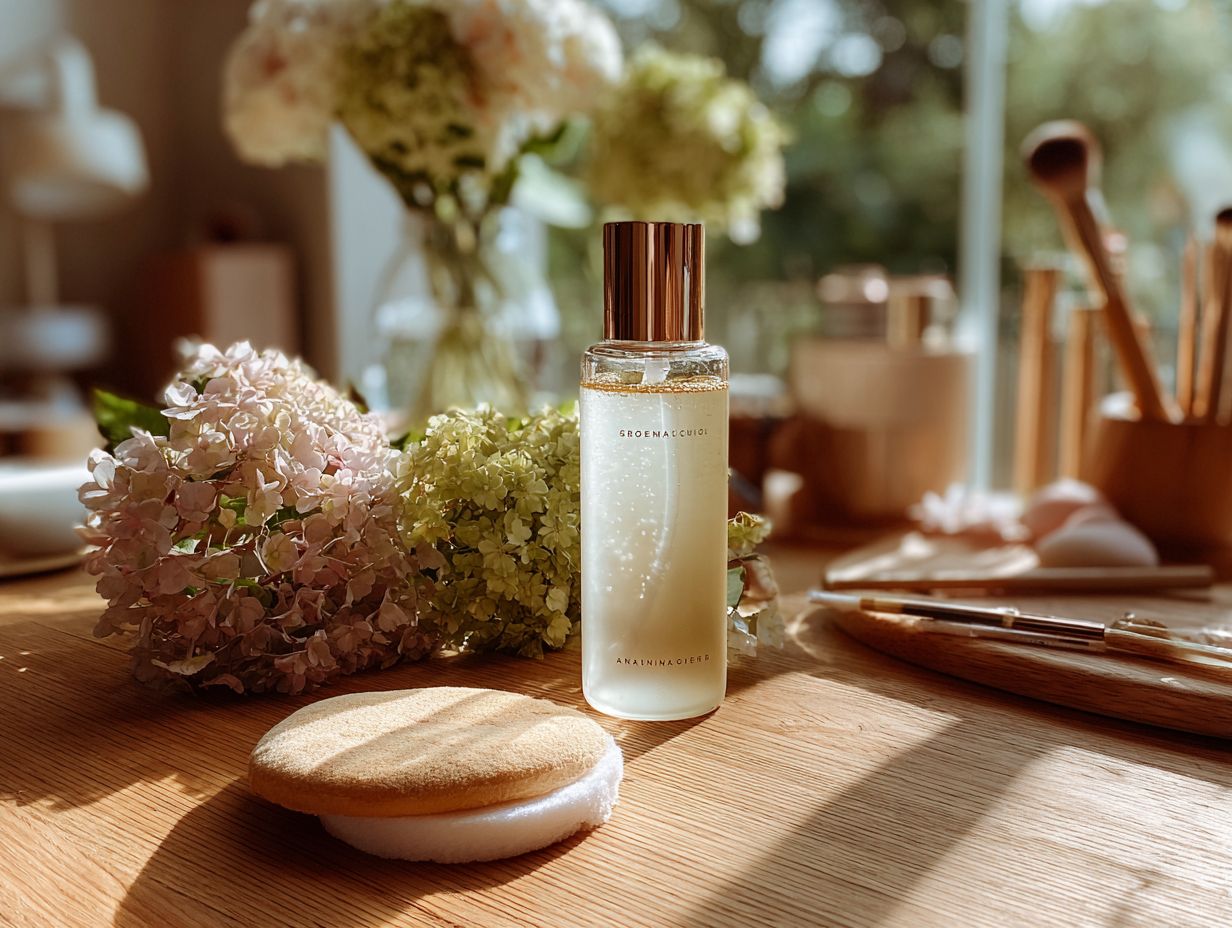
Do You Really Need a Toner? The Truth About This Tonic Step
Yes, a toner is an essential step in any skincare routine. It helps to balance your skin’s pH levels, remove any leftover impurities, and prepare your skin for better absorption of other skincare products. Beauty buffs know the toner necessity for achieving glowing skin.
What is the purpose of using a toner?
The main purpose of using a toner is to balance the pH levels of your skin. After cleansing, the pH levels of your skin can become unbalanced, making it more prone to bacteria and other skin issues. A brightening toner can further enhance your skin tone. A toner helps to restore the pH balance and protect your skin.
Is a toner only suitable for people with oily skin?
No, toners are suitable for all skin types. They can help to control excess oil production in oily skin, but they also provide hydration and nourishment for dry or combination skin. It is important to choose a toner that is specifically formulated for your skin type.
Can I skip using a toner if I have a simple skincare routine?
No, a toner is an important step in any skincare routine, no matter how simple. Experts like Dr. Ted Lain of Sanova Dermatology emphasize this. It helps to remove any remaining impurities, prep the skin for better absorption of products, and maintain the overall health and balance of your skin.
How often should I use a toner?
It is recommended to use a toner twice a day, after cleansing your face in the morning and evening. However, it can also be used throughout the day as a refresher or to remove excess oil and impurities.
Are toners only effective for younger individuals?
No, toners are effective for all age groups. Dr. Nikoleta Brankov, the Millennial Doc, also supports this notion. As we age, our skin’s natural ability to maintain its pH balance decreases, making a toner even more important for maintaining healthy skin. It can also help to target specific skin concerns such as fine lines, wrinkles, and age spots.


